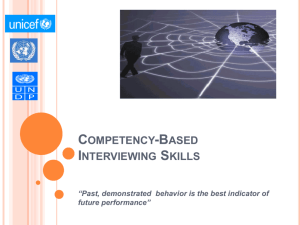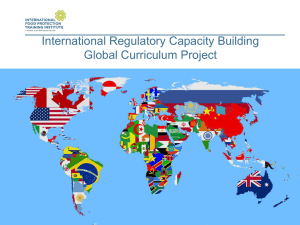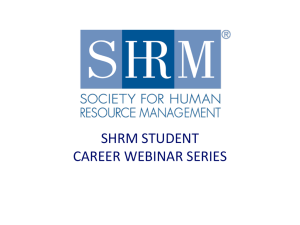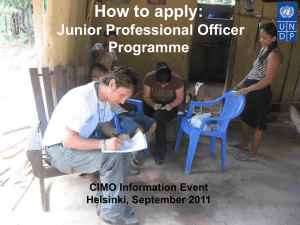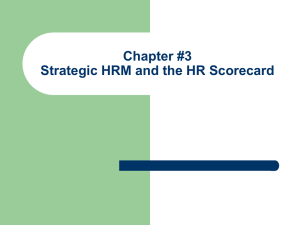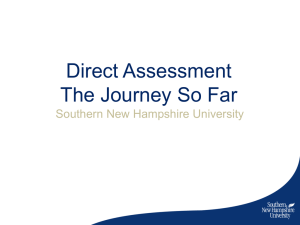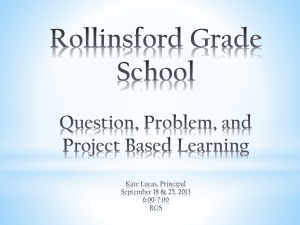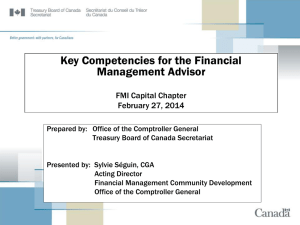Competency-based Interviews
advertisement
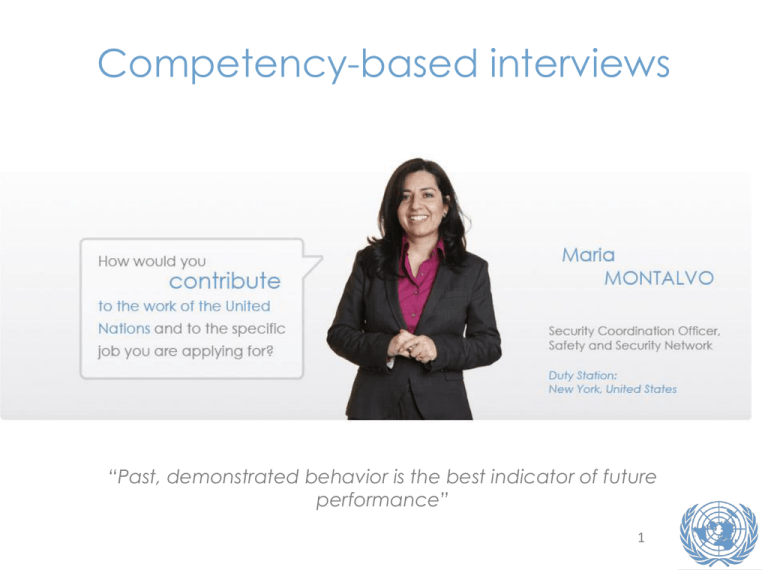
Competency-based interviews “Past, demonstrated behavior is the best indicator of future performance” 1 Values and Competencies • Values: o Shared principles and beliefs that underpin the Organization’s work and guide actions and behaviours of staff • Competencies: o Skills, attributes and behaviours directly related to successful job performance 2 Values and Competencies Core Values Integrity o Professionalism o Respect for Diversity o Core Competencies Communication o Teamwork o Planning and Organizing o Accountability o Creativity o Client Orientation o Commitment to Continuous Learning o Technological Awareness o Managerial Competencies Vision o Leadership o Empowering Others o Managing Performance o Building Trust o Judgement and Decisionmaking o 3 Why competency-based interviews (CBI)? • Competencies are forward-looking; they describe skills and attributes that staff and managers need to build human capital and meet future challenges • Competencies help organizations clarify expectations and define future development needs • CBI questions ask about past professional experiences that can demonstrate that the candidate is competent • The theory is that if you can demonstrate that you have done it in the past or have learned from the past, chances are that you will be able to do it in the future • When assessing the candidates responses, panels will ascertain the depth and complexity of the responses given by candidates • CBI is sometimes referred to as behavioral or situational interviewing 4 CAR (L) Principle • Context: o You will be expected to give an overview of the situation: what the situation was about, when it was, how you first got involved, what were the key events and the time frame • Actions o You will be expected to cover significant events, specific instances, that were clearly attributable to you rather than the team • Results o What was the outcome, impact or results of your actions: You may be asked questions such as how did it turn out? What was the final result? • Learning o What learning did you take away from this experience 5 Preparing and Practicing • Be flexible and non-demanding with timing • Prepare for the interview: o learn as much as you can about the organization (mandate, publications, organigrame, strategic directions, news, etc.) o understand the position and look at the competencies in the job opening o review your application/PHP and select real examples matching your accomplishments to the competencies (i.e. how did you work in a team, solve conflict, mobilize resources, etc.) • Practice, practice, practice beforehand (refer to your application and the requirements of the job opening) • If a: o o face-to face, know what you are going to wear and err on the side of conservatism telephone (or Skype/VTC) make sure you are in a private location and equipment is working 6 During the interview: do • Make a good first and last impression • Dress appropriately • Maintain eye contact with the person who asked the question, if culturally appropriate • Even on the telephone, smile • Listen carefully to the complete question • Keep to the point. Be as specific as possible • Provide concrete examples that show you were able to handle a situation and/or learned from it • Listen to the question carefully. Ask for clarification if a question is not clear 7 During the interview: do not • Answer in the hypothetical. • Talk about “we”, rather talk in the “I” • Espouse theories or values (“waffling on”) • Make blanket generalizations nor statements about the future • Interrupt the panel • Ask questions about benefits and entitlements 8 Exercise Teamwork • Describe to us a successful teamwork work experience o o o o o o What was the situation? Which was your role? What made the team successful? How did you handle the disagreements within the team? What were the results? What did you learn from the experience? If you had to do it again what would you do differently? 9 Exercise Planning and Organizing • Tell us about a time you had to organize or plan a major event o What was the nature of the event? o Which was your role? o How did you plan and organize the different actions to carry out? o How did the event turn out? o Reflecting back, what did you learn from the experience? If you had to do it again what would you do differently? 10 Exercise Planning and Organizing • Tell us about a time where you had a number of demands being made on you at the same time? How did you handle it? o What was the situation? o Which was your role? o How did you plan and organize the different actions to carry out? o What were the results? o What did you learn from the experience? If you had to do it again what would you do differently? 11 Exercise Creativity • Describe to us a situation when you had to be creative o o o o o What was the nature of the situation? Which was your role? What were the different actions to carry out? What were the results? What did you learn from the experience? If you had to do it again what would you do differently? 12 Exercise Integrity • Describe to us a situation where you felt pressured to act in a way that would compromise your values or those of the organization o o o o o What was the nature of the situation? What were the implications of your actions? How did you respond to the pressure? What was the results? What did you learn from the experience? If you had to do it again what would you do differently? 13 Merci Thank you ﺷﻜﺮﺍ www.un.org 谢谢 http://careers.un.org Gracias Спасибо .com/UN.Careers
